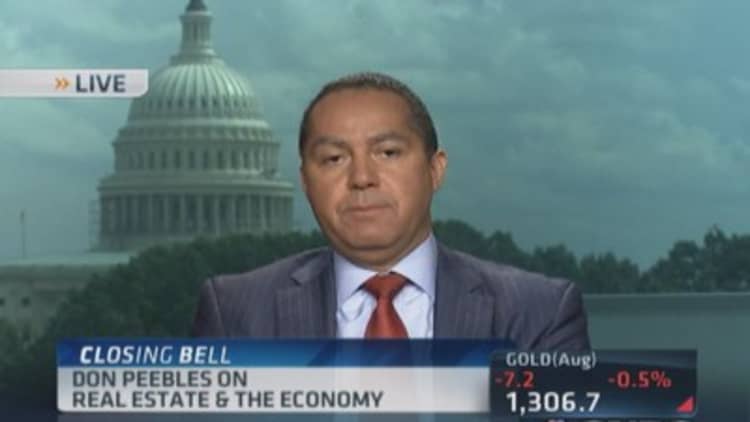Prices in the one of the world's most expensive housing markets are set to pick up pace this year, triggering renewed warnings of a potential bubble brewing.
According to a note from HSBC this week, while growth in real estate prices showed some signs of cooling in May, a strong bounce back in house price data and auction clearance rates in June and July could mean prices will end the year 10 percent higher.
"While we remain of the view that Australia does not currently have a housing bubble, it seems likely that if the current housing market trends were to persist for too long, there would be a risk of inflating one... the longer mortgage rates remain at low levels, the more this risk grows," said Paul Bloxham, chief economist for Australia and New Zealand at HSBC.
Read MoreAustralia stocks: Good times to roll on
Prices in Australia have more than tripled since 1997, on the back of low interest rates, high incomes and growing demand from Asia.
HSBC says signs of exuberance are most acute in Sydney, which was branded the second-most unaffordable city to buy a house in the English-speaking world by the Demographia International Housing Affordability Survey published earlier this year.
Prices in the city have risen 15 percent in the past 12 months to the end of June, compared to only 7 percent weighted average of other capital cities, HSBC noted. Meanwhile, the investor share of Sydney property has reached record highs.
Read MoreMillion dollar homes: Reclaimed
"Developments in the Sydney market are more worrisome. The current pace of housing price growth... seems likely to be unsustainable," said Bloxham.
The bank noted that Sydney's slower supply response due to restrictions on land release has prompted concerns that supply might not be able to meet demand, fueling even higher prices. Meanwhile expectations of price rises now seem to be driving market gains, a trend HSBC says is a key characteristic of a bubble.
However, other analysts told CNBC that there have been several warnings of Australia property bubbles in recent times, but none has come to pass.
Read MoreVolatilePhoenix housing: A cautionary tale
"If you look at the set-up of the country, 87 percent of the population live in major cities, so there will always be demand and not enough supply," said Evan Lucas, strategist at trading firm IG.
"It's different from other economies for that reason. That's why we have had a lot of calls for a bubble which haven't materialized. Prices will cool but not crash as some are suggesting," he added.
"Most arguments that are being made today [in terms of the risks of a property bubble] are ones that could have been made in the past 20 years. The question is what's new?" said Steve Goldman, manager of Sydney-based Kapstream Capital.
Read MoreUn-advertised listings distort housing inventory
To be sure, HSBC flagged some mediating factors that could prevent a possible crash.
House owners in Australia tend to be on the wealthier end of the spectrum, making them less likely to default on their debt, Bloxham said, adding that existing mortgage holders have been paying down their mortgages faster than required recently, making them less of a risk.

Meanwhile, even as housing construction has picked up in Australia, there are still not enough houses being built to fuel demand, a factor which should prevent a severe price correction.
What now for rates?
While the low interest rate environment is the major factor driving Australian property upside, HSBC warned that buyers shouldn't get too comfortable, as they expect the central bank to act soon to rein in the housing market.
Read MoreNew home sales tumble in June at fastest rate in nearly a year
The Reserve Bank of Australia kept rates steady at a record low of 2.5 percent for the 10th policy meeting in July, in a bid to support an economy weathering a slowdown in mining investment.
"The RBA will need to be wary of not falling into the trap of leaving interest rates too low, for too long and driving excessive risk taking in the housing market," said Bloxham.
"We still see rates needing to rise earlier than the market is currently pricing in, with a hike expected as early as H1 2015," he added.
But not all analysts agree.
Read MoreUS seasonally adjusted home prices fall in May:S&P/Case-Shiller
"Our view there is zero probability of the RBA hiking rates in the next year. I think they are more worried about the downside of the transition from mining investment to manufacturing and the services sector with the currency remaining as strong as it is," said Kapstream's Goldman.
"If they were do something they are more likely to cut than to hike. The RBA will be much more focused on the overall economy than housing in Sydney," he added.


